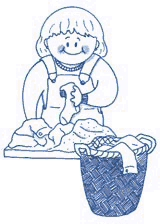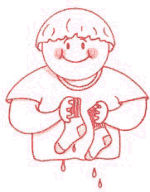|
Getting Along
Learning to get along with others is very important for children's social development.

- Give your child lots of personal attention and encouragement. Set aside time when you and your child can do enjoyable things together. Your positive feelings for your child will help him to feel good about himself.
- Set a good example. Show your child what it means to get along with others and to be respectful. Let her hear you say "please" and "thank you" when you talk to others. Treat people in ways that show you care what happens to them.
- Help your child find ways to solve conflicts with others. Help him to figure out what will happen if he shows his anger by hitting a playmate: "James, I know that Zoe took your truck without asking. But if you hit her and you have a big fight, then she will have to go home and the two of you won't be able to play any more today. What's another way that you can let Zoe know you want your truck back?"
- Make opportunities for your child to share and to care. Let her take charge of providing food for birds. When new families move into the neighborhood, let her help make cookies to welcome them.
- Be physically affectionate. Children need hugs, kisses, an arm over the shoulder and a pat on the back.
- Tell your child that you love him. Don't assume that your loving actions will speak for themselves (although they are very important).
Learning to work with and get along with others contributes to children's success in school. |
Chores

Any household task can become a good learning game - and can be fun.
What You Need
Jobs around the home that need to get done, such as:
- Doing the laundry
- Washing and drying dishes
- Carrying out the garbage
- Setting the dinner table
- Dusting
What to Do
- Tell your child about the job you will do together. Explain why the family needs the job done. Describe how you will do it and how your child can help.
- Teach your child new words that are associated with each job: "Let's put the placemats on the table first, then the napkins."
- Doing laundry together provides many opportunities for your child to learn. Ask him to help you remember all the clothes that need to be washed. See how many things he can name: socks, T-shirts, pajamas, sweater, shirt. Have him help you gather all the dirty clothes, then help you make piles of light and dark colors.

- Show your child how to measure the soap and have him pour the soap into the machine. Let him put the items into the machine, naming each one. Keep out one sock. When the washer is filled with water, take out the mate to the sock. Let your child hold the wet sock and the one that
you kept out. Ask him which one feels heavier and which one feels lighter. After the wash is done, have your child sort his own things
into piles that are the same (for example, T-shirts, socks).
Home chores can help children learn new words, how to listen and follow directions, how to count and how to sort. Chores can also help children improve their physical coordination and learn responsibility. |
Learning Activities for Children:
|
|
|